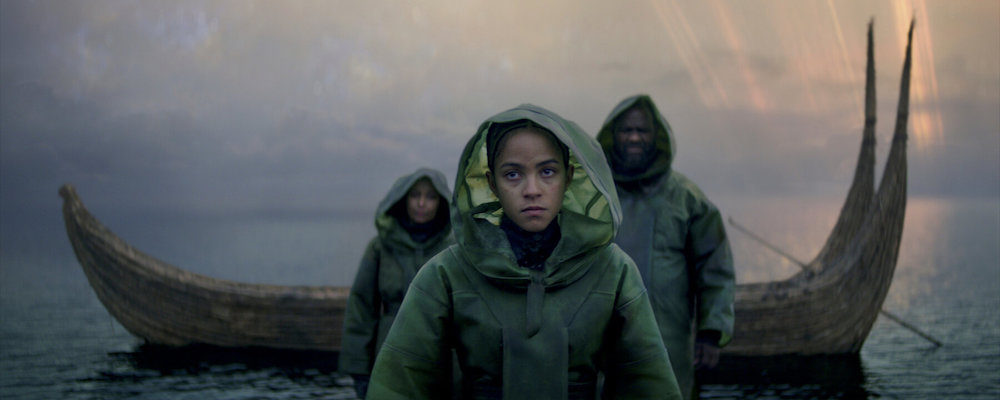Apple TV’s ‘Foundation’ Imagines a Visually Rich Future in a Real Slow Burner
Alci Rengifo
Some cultural writers have termed Peak TV as the new novel, since viewers binge through episodes the way a book lover devours chapters. Apple TV’s latest attempt at grabbing the sci-fi crown, “Foundation,” is an example of the good and tediously bad when it comes to this idea. From the beginning it looks fantastic, boasting lavish production design and rich cinematography. For some viewers this will be merciful, at least if they plow through the first few episodes, because when the plot is dragging, you can at least just look at the show. As with some of Apple’s other high budget series, the desire to look massive overtakes a lean narrative.
Creators David S. Goyer and Josh Friedman base their concept on a series of novels and stories by legendary sci-fi author Isaac Asimov. As in the novels, the starting point is Trantor, capital of the Galactic Empire that runs the galaxy sometime in the far, far, far future. To the capital arrives Gaal (Lou Llobell) a mathematical prodigy who has caught the attention of Hari Seldon (Jared Harris). Seldon is a keen mind who has developed “psychohistory.” He has developed a controversial predictive model that foresees the Empire collapsing in a few centuries, ushering in 30,000 years of a new Dark Age. This ruffles the feathers of the Empire’s ruling triumvirate, Brother Dusk (Terrence Mann), Brother Day (Lee Pace) and young Brother Dawn (Cooper Carter). A major terrorist attack takes place during a visit by “barbarian” dignitaries, destroying a ship base above the planet. The sudden sign of unrest and the Empire’s weakness frightens the Brothers. Seldon warns that this is just the beginning and once the Empire does fall, it is imperative they preserve knowledge and history so the Dark Age can only last 1,000 years. He and Gaal are exiled on a mission to go planet jumping and preserve the Empire’s vast trove of information. Of course, the real reason is they see Seldon as dangerous.
“Foundation” breaks new ground in giving a fresh meaning to that popular phrase, “slow burner.” This is probably the priciest slow burner show ever made. Like Apple’s “See,” the obvious, immediate visual influence is “Game of Thrones.” Asimov himself apparently based the structure of “Foundation” on Edward Gibbons’ classic six-part work of history, “The History of the Decline and Fall of the Roman Empire.” Unfortunately Trantor’s court intrigues are not as juicy as Ancient Rome. In various ways “Foundation” might work for the very die hard sci-fi aficionado who will savor every detail and archaic term like a Yu-Gi-Oh card player. Take notes to make sense of the terminology used and the mathematical formulas that get Seldon into such trouble. It is important to keep track as well of the imperial bloodline, which is done through a cloning process that essentially keeps the same emperor, or his essence, Cleon, endlessly returning. Thankfully we do get subtitles to explain when a new one is born, as if this were a combo of “Dune” and Suetonius’s “The Twelve Caesars.”
Like the Asimov novels, the premise of “Foundation” is engaging on its own because it can be classic sci-fi allegory. Although the stories were published in 1942 and the eventual novels began appearing in 1951, the idea of an overstretched empire beginning to crumble, with wars abroad and paranoia over terrorism at home, is all strikingly contemporary. The characters also argue about themes such as rationality versus religion, or the importance of preserving history. Gaal comes from a planet where leaders persecute scientists and deny the oceans are rising, sound familiar? If only all these topics would be explored in something with more energy or flow to it. Not only is “Foundation” tedious in its early episodes, which consist of many meandering conversations between the Brothers and their aide, Demerzel (Laura Birn), there are sudden time jumps as well. Gaal and Seldon are banished at the end of the pilot, then in the second episode we see them adjusting to life on a ship that will take 4 years to get to their next destination. Suddenly, events unfold and they push them completely out of the story.
Mid-way through the season the main character becomes Salvor Hardin (Leah Harvey), who leads the colony Gaal and Seldon were originally attached to, on a planet that looks shared with the “Dune” crew, where a strange alien structure of unknown origin hovers on the horizon. This all shoves for space with Trantor intrigues. Another worthy element along with the visuals is the performances. Jared Harris has mastered playing the brain no one will listen to and Lou Llobell is a young actor with grit. The showrunners have switched around the genders of some of Asimov’s key characters and it does work to excellent effect. However, much of the better acting belongs to the Brothers. Lee Pace, in particular, is a great villain, using his deep voice to convey total arrogance and hidden violence. When he orders an execution or waves away a mere mortal, we loathe the character but love the acting craft.
Along with other genres, science fiction has been undergoing a renaissance on television. It has been easy to lose track of how many dystopias or space adventures, produced with immense budgets, we now get offered by nearly every streamer. “Foundation” has much promise because of its source material and look. The space sequences are elegant and designed with real believability. It just has a pace and structure that might prove taxing. History can be thrilling, as well as sci-fi that finds inspiration in the great historical chronicles. But like a bloated novel that might take forever to get moving, “Foundation” doesn’t just challenge us to think, it also challenges us to see if we can endure another 54-minute chapter.
“Foundation” season one begins streaming Sept. 24 with new episodes premiering every Friday on Apple TV+.

